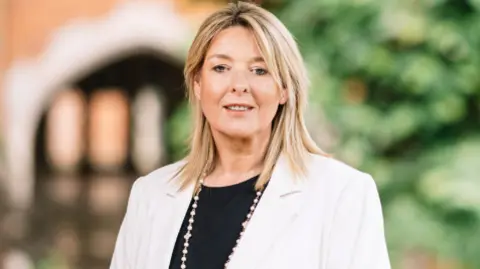Large rise in NI universities' mental health spending since Covid
 Getty Images
Getty ImagesThe amount of money Northern Ireland universities are spending on mental health and wellbeing services for students has increased significantly since the Covid-19 pandemic.
Figures received via Freedom of Information requests have revealed the amount of money allocated has increased by an average of more than 40% since 2020.
That includes the annual amount for salaries, wellbeing services and counselling.
Northern Ireland's mental health champion welcomed the increased spending but called for a joined-up approach with statutory services.
Professor Siobhan O'Neill said starting university very often coincided with the age at which most common mental disorders first present themselves.
She put an increase in the recorded rates of poor mental health in students down to "increased financial and social pressure" as well as a "reduced stigma and a willingness to ask for help".
"International students, and those from marginalised communities such as students from black and ethnic minority groups, disabled students and LGBT+ students are at higher risk," she added.
Ms O'Neill said the increased spending on mental health services "reflects a recognition of the importance of providing timely access to mental health support to students who are struggling, so that students can fully benefit from higher education, and reduce the risk of dropout".
However, the mental health champion said this support needed to be accompanied by improvements in statutory mental health services.
"For example, a project linking university and statutory services in the Belfast Trust has been very effective, but it needs to be available in other areas of Northern Ireland."
St Mary's: 85% increase
St Mary's University College, Belfast has seen the biggest increase with an 85.5% rise in spending from £124,927 in the 2019/20 academic year to £231,691 in 2023/24.
It said it had also received double its additional funding from the Department of Education's Step-Up Project with £50,000 in 2023/24 rising to £100,000 in 2024/25.
This funding, a university spokesperson added, had been used to support the wellbeing of students using one-to-one mentor support and counselling services.
Stranmillis: 62% increase
Stranmillis University College saw a 62% rise over the five years from £55,043 in 2020 to £89,208 in 2024.
It said it operated a free and confidential, permanently-staffed student counselling service and had a qualified occupational health nurse on site.
"College staff operate an 'open door' policy where students are encouraged to make contact and to discuss issues of concern to them," the university added.
QUB: 52% increase
The amount of spending on mental health services at Queen's University Belfast saw a 52% jump from £931,615 in the 2019/20 academic year to £1,417,539 in 2023/24.
The university added that there was a wide range of embedded mental health events and initiatives across the academic year for students.
Ulster University: 32%
Ulster University's spending on mental health services increased 32% from £1,916,528 in the 2019/20 academic year to £2,535,553 in 2023/24.
It said the university promoted positive mental health and wellbeing initiatives to all pupils via its student wellbeing team, and offered them access to an external counselling provider.
'I wasn't able to cope'

Dara Doyle, 21, a third year psychology student at Queen's University Belfast, said he first reached out for help in 2023.
"I wasn't able to cope with the pressure of the work that was on me," he said.
"I was working part time and quite long hours away from the university and I was having a lot of social isolation. I wasn't feeling myself and knew I needed to talk to someone to make a plan to get back to being myself."
Dara said he accessed a drop-in service and was then offered six sessions of counselling as well as semi-regular check-ups with his wellbeing support officer.
He felt there was still a reluctance among young men to speak about their mental health.
"They are trying to seem strong and hold everything together. There is a social judgement when you speak out and say 'look, I'm actually struggling'."
'Significant change'
 Queen's University Belfast
Queen's University BelfastCaroline Young, the vice president for students and corporate services at Queen's University Belfast, said since the pandemic there has been "a significant change in the support that's needed for the young people".
Some feel anxious about the change to university life, she said, while others have "potentially much more significant pre-existing conditions, or situations".
Queen's offers online help, a daily drop-in service and one-to one counselling.
"I don't expect it to go away," she said.
"What we hope to be able to do is to ensure that there are lots of ways students can understand how to deal with and support their own well-being."
